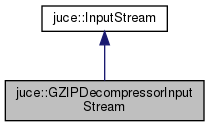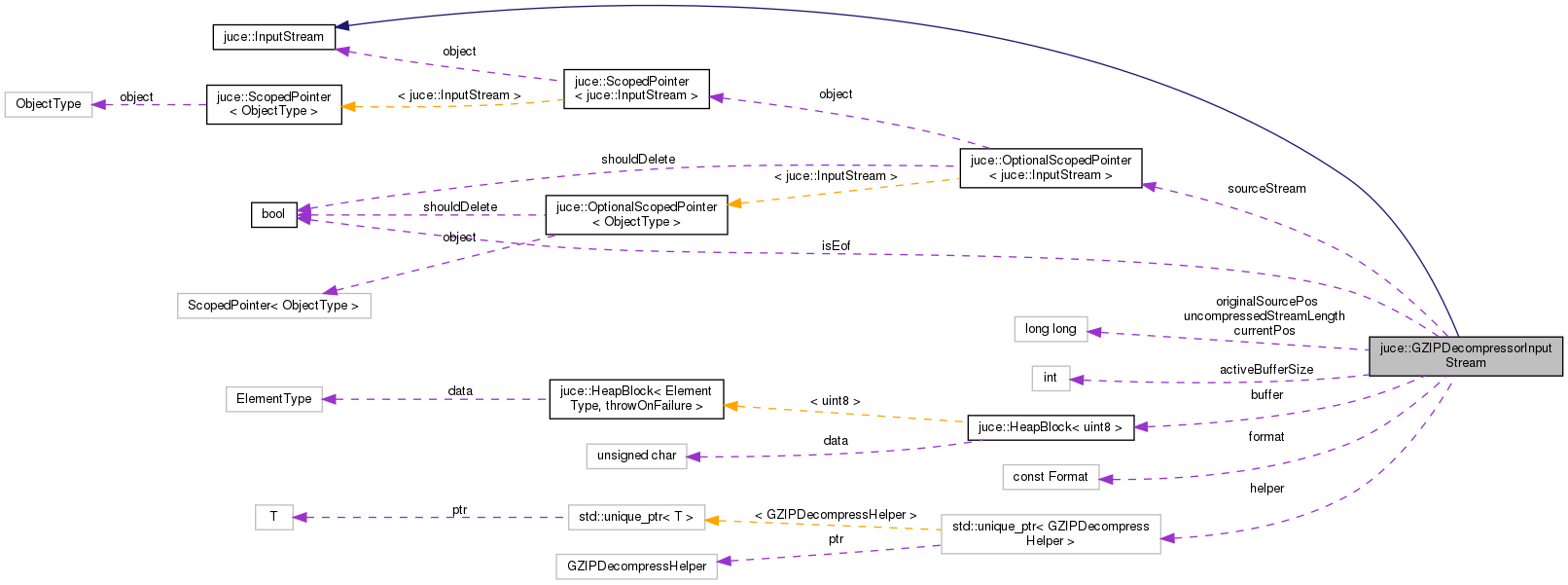This stream will decompress a source-stream using zlib.
More...
#include <juce_GZIPDecompressorInputStream.h>
This stream will decompress a source-stream using zlib.
Tip: if you're reading lots of small items from one of these streams, you can increase the performance enormously by passing it through a BufferedInputStream, so that it has to read larger blocks less often.
- See also
- GZIPCompressorOutputStream
{Core}
◆ Format
| Enumerator |
|---|
| zlibFormat | |
| deflateFormat | |
| gzipFormat | |
◆ GZIPDecompressorInputStream() [1/2]
| juce::GZIPDecompressorInputStream::GZIPDecompressorInputStream |
( |
InputStream * |
sourceStream, |
|
|
bool |
deleteSourceWhenDestroyed, |
|
|
Format |
sourceFormat = zlibFormat, |
|
|
int64 |
uncompressedStreamLength = -1 |
|
) |
| |
Creates a decompressor stream.
- Parameters
-
| sourceStream | the stream to read from |
| deleteSourceWhenDestroyed | whether or not to delete the source stream when this object is destroyed |
| sourceFormat | can be used to select which of the supported formats the data is expected to be in |
| uncompressedStreamLength | if the creator knows the length that the uncompressed stream will be, then it can supply this value, which will be returned by getTotalLength() |
◆ GZIPDecompressorInputStream() [2/2]
| juce::GZIPDecompressorInputStream::GZIPDecompressorInputStream |
( |
InputStream & |
sourceStream | ) |
|
Creates a decompressor stream.
- Parameters
-
| sourceStream | the stream to read from - the source stream must not be deleted until this object has been destroyed |
◆ ~GZIPDecompressorInputStream()
| juce::GZIPDecompressorInputStream::~GZIPDecompressorInputStream |
( |
| ) |
|
|
override |
◆ getNumBytesRemaining()
| int64 juce::InputStream::getNumBytesRemaining |
( |
| ) |
|
|
inherited |
Returns the number of bytes available for reading, or a negative value if the remaining length is not known.
- See also
- getTotalLength
◆ getPosition()
| int64 juce::GZIPDecompressorInputStream::getPosition |
( |
| ) |
|
|
overridevirtual |
◆ getTotalLength()
| int64 juce::GZIPDecompressorInputStream::getTotalLength |
( |
| ) |
|
|
overridevirtual |
Returns the total number of bytes available for reading in this stream.
Note that this is the number of bytes available from the start of the stream, not from the current position.
If the size of the stream isn't actually known, this will return -1.
- See also
- getNumBytesRemaining
Implements juce::InputStream.
◆ isExhausted()
| bool juce::GZIPDecompressorInputStream::isExhausted |
( |
| ) |
|
|
overridevirtual |
◆ read()
| int juce::GZIPDecompressorInputStream::read |
( |
void * |
destBuffer, |
|
|
int |
maxBytesToRead |
|
) |
| |
|
overridevirtual |
Reads some data from the stream into a memory buffer.
This is the only read method that subclasses actually need to implement, as the InputStream base class implements the other read methods in terms of this one (although it's often more efficient for subclasses to implement them directly).
- Parameters
-
| destBuffer | the destination buffer for the data. This must not be null. |
| maxBytesToRead | the maximum number of bytes to read - make sure the memory block passed in is big enough to contain this many bytes. This value must not be negative. |
- Returns
- the actual number of bytes that were read, which may be less than maxBytesToRead if the stream is exhausted before it gets that far
Implements juce::InputStream.
◆ readBool()
| virtual bool juce::InputStream::readBool |
( |
| ) |
|
|
virtualinherited |
Reads a boolean from the stream.
The bool is encoded as a single byte - non-zero for true, 0 for false. If the stream is exhausted, this will return false.
- See also
- OutputStream::writeBool
◆ readByte()
| virtual char juce::InputStream::readByte |
( |
| ) |
|
|
virtualinherited |
◆ readCompressedInt()
| virtual int juce::InputStream::readCompressedInt |
( |
| ) |
|
|
virtualinherited |
◆ readDouble()
| virtual double juce::InputStream::readDouble |
( |
| ) |
|
|
virtualinherited |
Reads eight bytes as a 64-bit floating point value.
The raw 64-bit encoding of the double is read from the stream as a little-endian int64. If the stream is exhausted partway through reading the bytes, this will return zero.
- See also
- OutputStream::writeDouble, readFloat
◆ readDoubleBigEndian()
| virtual double juce::InputStream::readDoubleBigEndian |
( |
| ) |
|
|
virtualinherited |
Reads eight bytes as a 64-bit floating point value.
The raw 64-bit encoding of the double is read from the stream as a big-endian int64. If the stream is exhausted partway through reading the bytes, this will return zero.
- See also
- OutputStream::writeDoubleBigEndian, readFloatBigEndian
◆ readEntireStreamAsString()
| virtual String juce::InputStream::readEntireStreamAsString |
( |
| ) |
|
|
virtualinherited |
Tries to read the whole stream and turn it into a string.
This will read from the stream's current position until the end-of-stream. It can read from UTF-8 data, or UTF-16 if it detects suitable header-bytes.
◆ readFloat()
| virtual float juce::InputStream::readFloat |
( |
| ) |
|
|
virtualinherited |
Reads four bytes as a 32-bit floating point value.
The raw 32-bit encoding of the float is read from the stream as a little-endian int. If the stream is exhausted partway through reading the bytes, this will return zero.
- See also
- OutputStream::writeFloat, readDouble
◆ readFloatBigEndian()
| virtual float juce::InputStream::readFloatBigEndian |
( |
| ) |
|
|
virtualinherited |
Reads four bytes as a 32-bit floating point value.
The raw 32-bit encoding of the float is read from the stream as a big-endian int. If the stream is exhausted partway through reading the bytes, this will return zero.
- See also
- OutputStream::writeFloatBigEndian, readDoubleBigEndian
◆ readInt()
| virtual int juce::InputStream::readInt |
( |
| ) |
|
|
virtualinherited |
Reads four bytes from the stream as a little-endian 32-bit value.
If the next four bytes are byte1 to byte4, this returns (byte1 | (byte2 << 8) | (byte3 << 16) | (byte4 << 24)).
If the stream is exhausted partway through reading the bytes, this will return zero.
- See also
- OutputStream::writeInt, readIntBigEndian
◆ readInt64()
| virtual int64 juce::InputStream::readInt64 |
( |
| ) |
|
|
virtualinherited |
Reads eight bytes from the stream as a little-endian 64-bit value.
If the next eight bytes are byte1 to byte8, this returns (byte1 | (byte2 << 8) | (byte3 << 16) | (byte4 << 24) | (byte5 << 32) | (byte6 << 40) | (byte7 << 48) | (byte8 << 56)).
If the stream is exhausted partway through reading the bytes, this will return zero.
- See also
- OutputStream::writeInt64, readInt64BigEndian
◆ readInt64BigEndian()
| virtual int64 juce::InputStream::readInt64BigEndian |
( |
| ) |
|
|
virtualinherited |
Reads eight bytes from the stream as a big-endian 64-bit value.
If the next eight bytes are byte1 to byte8, this returns (byte8 | (byte7 << 8) | (byte6 << 16) | (byte5 << 24) | (byte4 << 32) | (byte3 << 40) | (byte2 << 48) | (byte1 << 56)).
If the stream is exhausted partway through reading the bytes, this will return zero.
- See also
- OutputStream::writeInt64BigEndian, readInt64
◆ readIntBigEndian()
| virtual int juce::InputStream::readIntBigEndian |
( |
| ) |
|
|
virtualinherited |
Reads four bytes from the stream as a big-endian 32-bit value.
If the next four bytes are byte1 to byte4, this returns (byte4 | (byte3 << 8) | (byte2 << 16) | (byte1 << 24)).
If the stream is exhausted partway through reading the bytes, this will return zero.
- See also
- OutputStream::writeIntBigEndian, readInt
◆ readIntoMemoryBlock()
| virtual size_t juce::InputStream::readIntoMemoryBlock |
( |
MemoryBlock & |
destBlock, |
|
|
ssize_t |
maxNumBytesToRead = -1 |
|
) |
| |
|
virtualinherited |
Reads from the stream and appends the data to a MemoryBlock.
- Parameters
-
| destBlock | the block to append the data onto |
| maxNumBytesToRead | if this is a positive value, it sets a limit to the number of bytes that will be read - if it's negative, data will be read until the stream is exhausted. |
- Returns
- the number of bytes that were added to the memory block
◆ readNextLine()
| virtual String juce::InputStream::readNextLine |
( |
| ) |
|
|
virtualinherited |
Reads a UTF-8 string from the stream, up to the next linefeed or carriage return.
This will read up to the next "\n" or "\r\n" or end-of-stream.
After this call, the stream's position will be left pointing to the next character following the line-feed, but the linefeeds aren't included in the string that is returned.
◆ readShort()
| virtual short juce::InputStream::readShort |
( |
| ) |
|
|
virtualinherited |
Reads two bytes from the stream as a little-endian 16-bit value.
If the next two bytes read are byte1 and byte2, this returns (byte1 | (byte2 << 8)). If the stream is exhausted partway through reading the bytes, this will return zero.
- See also
- OutputStream::writeShort, readShortBigEndian
◆ readShortBigEndian()
| virtual short juce::InputStream::readShortBigEndian |
( |
| ) |
|
|
virtualinherited |
Reads two bytes from the stream as a little-endian 16-bit value.
If the next two bytes read are byte1 and byte2, this returns (byte2 | (byte1 << 8)). If the stream is exhausted partway through reading the bytes, this will return zero.
- See also
- OutputStream::writeShortBigEndian, readShort
◆ readString()
| virtual String juce::InputStream::readString |
( |
| ) |
|
|
virtualinherited |
◆ setPosition()
| bool juce::GZIPDecompressorInputStream::setPosition |
( |
int64 |
newPosition | ) |
|
|
overridevirtual |
Tries to move the current read position of the stream.
The position is an absolute number of bytes from the stream's start.
Some streams might not be able to do this, in which case they should do nothing and return false. Others might be able to manage it by resetting themselves and skipping to the correct position, although this is obviously a bit slow.
- Returns
- true if the stream manages to reposition itself correctly
- See also
- getPosition
Implements juce::InputStream.
◆ skipNextBytes()
| virtual void juce::InputStream::skipNextBytes |
( |
int64 |
numBytesToSkip | ) |
|
|
virtualinherited |
Reads and discards a number of bytes from the stream.
Some input streams might implement this more efficiently, but the base class will just keep reading data until the requisite number of bytes have been done. For large skips it may be quicker to call setPosition() with the required position.
Reimplemented in juce::MemoryInputStream.
◆ activeBufferSize
| int juce::GZIPDecompressorInputStream::activeBufferSize = 0 |
|
private |
◆ buffer
◆ currentPos
| int64 juce::GZIPDecompressorInputStream::currentPos = 0 |
|
private |
◆ format
| const Format juce::GZIPDecompressorInputStream::format |
|
private |
◆ helper
| std::unique_ptr<GZIPDecompressHelper> juce::GZIPDecompressorInputStream::helper |
|
private |
◆ isEof
| bool juce::GZIPDecompressorInputStream::isEof = false |
|
private |
◆ originalSourcePos
| int64 juce::GZIPDecompressorInputStream::originalSourcePos |
|
private |
◆ sourceStream
◆ uncompressedStreamLength
| const int64 juce::GZIPDecompressorInputStream::uncompressedStreamLength |
|
private |
The documentation for this class was generated from the following file:

